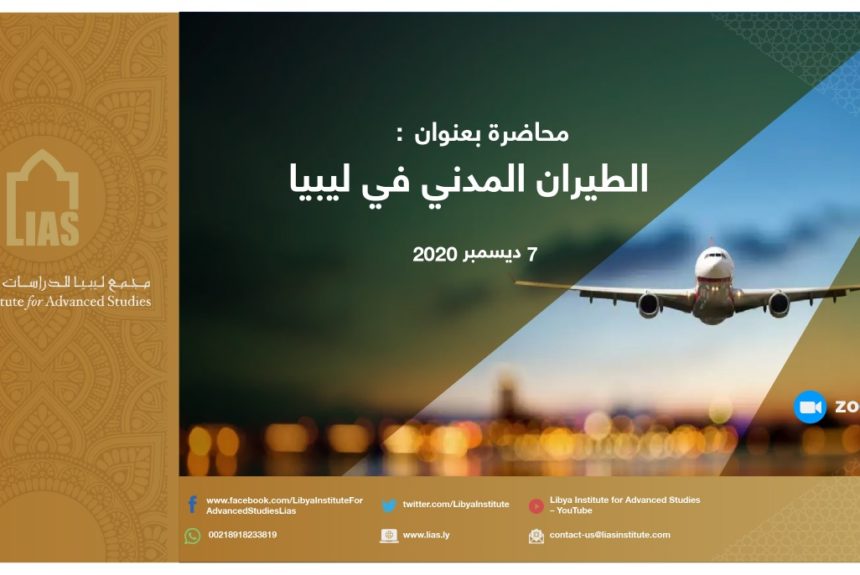The Libya Academy organized a lecture entitled: Civil Aviation in Libya, today, December 7, on the Zoom platform.
The lecture was given by Professor Salah Ayyad Al-Abbar

International trainer in airline marketing and sales.
Director of the Office of the Chairman of the Board of Directors of Libyan Airlines.
The talk was about Libyan Airlines in Libya, the date of establishment, experiences, and the date of joining the International Civil Aviation Organization, and that Libya was one of the first to enter, more than 15 years before many famous Arab international companies.
He made a presentation about the other challenges that the company faced in the past and in the present, and the role of aviation in tourism, development and international and local communication.
The professor also talked about a proposal he submitted regarding the establishment of a special ministry for aviation, and the importance of this lies in the national income, tourism, and introduction to the state, and through support, monitoring, and transparency. This ministry will have a large income for Libya, including the transit and transit system, due to Libya’s distinctive geographical location.
He stressed the importance of the state’s interest in the sector, its support, attracting talent, staying away from corruption, the role of education in developing aviation management, and keeping pace with specialized colleges in the world. Airlines must be structured, due to the inexperience of airlines and management, and inefficiency.
He wondered about the reason for the deterioration and instability of the level? Is the level of our companies weak? What are their current destinations? Why are Libyan airlines prevented from crossing Europe?
All of this is due to the lack of AEASA standards, the European Aviation Safety Agency, the lack of auditing of the work of aviation, of the engineers, of the system in the company, the absence or activation of administrative systems and regulations, and the criterion for that is the negligence of the airline companies, the lack of communication with them, the lack of quality detection. Comparison with other airlines and other standards.
He stressed that the Civil Aviation Authority or the Airports Authority should hurry to make airports according to international standards, because the aviation system in Libya does not apply to Libyan standards.
He pointed out the effects of the burning of airports, in addition to development problems and employment problems in the thousands, and wondered about the possibility of airline companies absorbing this huge number of employees.
He also touched on the standards of airlines, budget airlines, and state-supported companies, and that companies in Libya are not supported by the state but rather finance themselves, as well as private companies.
He also answered several questions raised during the meeting by the participants, including: How can we improve the aviation situation today, through actual practical methods? The multiplicity of airlines and small tourist airports?
He also noted the International Day of International Aviation, and their slogan this year: “Pushing innovation to develop global aviation,” and the need to pay attention to different types of aviation and benefit from them in development, agricultural technology, photography, and others.
He recommended that there be an aviation training sector that should be prepared for it in Libya instead of costly training in other countries, and the need to build and establish specialized training institutes and attract qualified trainers in the field of training, whether in issuing tickets, air transportation, or behavioral training. The aviation employee is The face of the country, because it is the first to receive tourists, so paying attention to training them through their wonderful language, their dealing style, and their grooming is of great importance in addition to technical matters!
He concluded by saying that the Libyan political situation has a role in developing and raising the level of civil aviation in Libya, taking care of it and solving its problems! The responsibility is great for officials and politicians, and this is a national and historical duty for which they will be held accountable.


